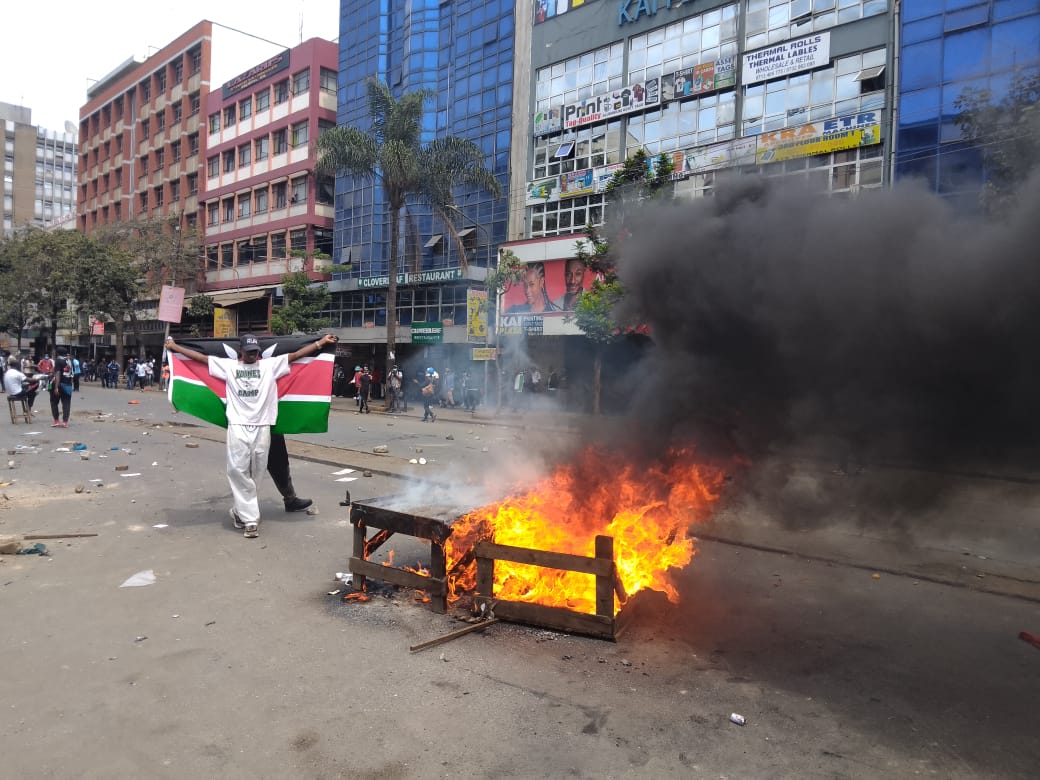
Kindiki vows action on anarchy planners after protests turned violent » Capital News
NAIROBI, Kenya July 2- Interior Cabinet Secretary Kithure Kindiki has vowed decisive action against the planners, financiers, and executors of the anarchy that followed the rejection of the Finance Bill.
In a statement Tuesday after days of violence that has left over 40 dead, Kindiki said an investigation is underway to identify those responsible for the unrest affecting innocent Kenyans.
Protests erupted in major cities including Nairobi, Mombasa, Nakuru, and Kisumu on Tuesday, leading to widespread vandalism and looting of businesses.
“The organisers of today’s violence in parts of Nairobi, Mombasa, and several other areas are reportedly planning to repeat their anarchic chaos and cruel plunder on Thursday and Sunday, and potentially more frequently in the future,” Kindiki stated.
This follows chaotic scenes that saw at least two additional fatalities in Nairobi, raising the total death toll from the protests to 41 since last week.

Initially sparked by opposition to the Finance Bill—which President Ruto ultimately declined to sign, sending it back to Parliament—the protests have consistently degenerated into violence.
“This reign of terror against the people of Kenya and the impunity of dangerous criminal gangs must end at whatever cost,” Kindiki warned, emphasizing the government’s resolve to stop criminals from terrorizing the public and harming the nation, despite attempts to politicize crime.
Opposition leader Raila Odinga and his Azimio coalition have accused the government of condoning police brutality and have demanded an end to the killings.
In Nairobi, police used tear gas to disperse small crowds on Tuesday after youth activists called for new protests following last month’s deadly demonstrations against tax hikes.
Despite President Ruto’s announcement last week that he would not sign the controversial finance bill into law, activists have continued their campaign against his administration.
The Kenya National Commission on Human Rights (KNCHR) reported on Monday that 39 people had been killed and 361 injured during two weeks of demonstrations, condemning the police’s use of force as “excessive and disproportionate.” Tuesday’s events brought the death toll to 41.
Protests turned violent in most towns, except Kisumu, with many businesses looted or vandalized.

President Ruto has appealed for an end to the protests, expressing his willingness to engage in dialogue with the youth to find a lasting solution and is already planning to speak on X-spaces.
“I am ready to speak to the GenZ’s in their own space so as to hear them and find a solution for the country,” he said Sunday.
On Tuesday, demonstrators were seen with placards with the hashtag #RutoMustGo, demanding a complete overhaul of the government.
Protesters stormed Parliament after MPs voted for the Finance Bill 2024 and were seen ransacking the complex in central Nairobi, setting parts of it ablaze, while police fired live bullets at protesters.
In a television interview on Sunday, Ruto acknowledged that there are lives lost but defended his decision to call in the armed forces to address the unrest, insisting he did not have “blood on my hands.”
Ruto’s decision to reverse the tax legislation has not appeased his critics. Despite his offer to engage with young Kenyans about their grievances, activists have vowed to continue protesting, with leaflets on social media calling for more actions this week. One leaflet, using the hashtag “RutoMustGo,” declared both Tuesday and Thursday public holidays for an “OccupyEverywhere” movement, urging all Kenyans to stage sit-down protests on major roads.
The KNCHR reported on Monday that, in addition to the dead and injured, there had been 32 cases of “enforced or involuntary disappearances” and 627 arrests of protesters. “The Commission continues to condemn in the strongest terms possible the unwarranted violence and force inflicted on protesters, medical personnel, lawyers, journalists, and on safe spaces such as churches, medical emergency centres, and ambulances,” the KNCHR stated.
Kenya’s government, which is facing severe financial constraints, previously argued that the tax increases were necessary to fill its coffers and service a massive public debt of approximately 10 trillion shillings ($78 billion), or about 70 percent of GDP.
